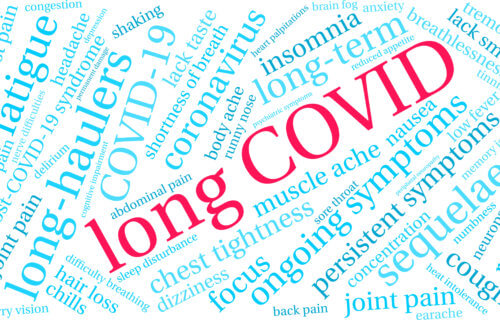LONDON — A staggering portion of Americans were wrestling with a case of long COVID at the end of 2022, according to a new, large-scale investigation. Scientists at both University College London and Dartmouth also note that dealing with a case of long COVID displays a link to both anxiety and low mood, in addition to a higher risk of continued physical mobility problems and cognitive challenges like memory, concentration, and understanding.
Notably, the study does suggest the risk of both anxiety and low mood is lower among vaccinated individuals, even if they still ended up getting long COVID.
“Little is known about long COVID and its impact on health and wellbeing, but there is a growing body of evidence that many people experience persistent and concerning symptoms,” says study co-author Professor Alex Bryson (UCL Social Research Institute) in a university release.
“Here, we have found that long COVID continues to affect millions of people in the US, with some groups much more affected than others. Those who have ever had long COVID remain more likely to report low mood, challenges in carrying out daily tasks, and challenges with memory, concentration and understanding, compared to people who have never had long COVID.”
To reach these conclusions, study authors analyzed data encompassing 461,550 people who responded to the U.S. Census Bureau’s Household Pulse Survey between June and December 2022. People who said they had never contracted COVID-19 were compared with others who had a COVID-19 infection without lingering symptoms, and those who currently or previously had long COVID.
According to the World Health Organization, study authors defined long COVID as the continuation or development of new symptoms at least three months following initial infection.

Study authors found close to half (47%) of those surveyed reported having COVID-19 at some point, while 14 percent of the total had long COVID at some point; half of whom (7%) reported still having long COVID symptoms while answering the survey. This work indicates one in three people who develop COVID-19 may experience long COVID symptoms. However, researchers caution their work was limited by the fact it relied on people self-reporting symptoms; some people surveyed may have had COVID-19 without ever knowing it.
The research team also reports anyone who ever had long COVID was more likely to display negative affect (anxiety, depression, worry, or a lack of interest in things), as well as physical mobility problems and issues dressing and bathing. All of those factors were self-reported by answering a questionnaire. A case of long COVID is also associated with self-reported problems with memory or concentration and issues with understanding or being understood.
Long COVID was more common among females, with elevated rates also noted among Caucasians, middle-aged people, and people with lower incomes or educational attainment. As far as U.S. states, long COVID was most common in West Virginia (18% of the population) and least common in Hawaii (11%).
Long COVID was also much more common among those who dealt with severe symptoms during their initial COVID-19 infection; 31 percent of people who reported currently having long COVID reported initially having severe COVID-19 symptoms, in comparison to just seven percent of the people who had COVID-19 without developing long COVID.
The study is published in PLoS ONE.
You might also be interested in:
- Threat of long COVID overblown by flawed science, study claims
- These 15 foods in an anti-inflammatory diet could treat long COVID
- Creatine cures long COVID? Popular exercise supplement relieves lingering symptoms

